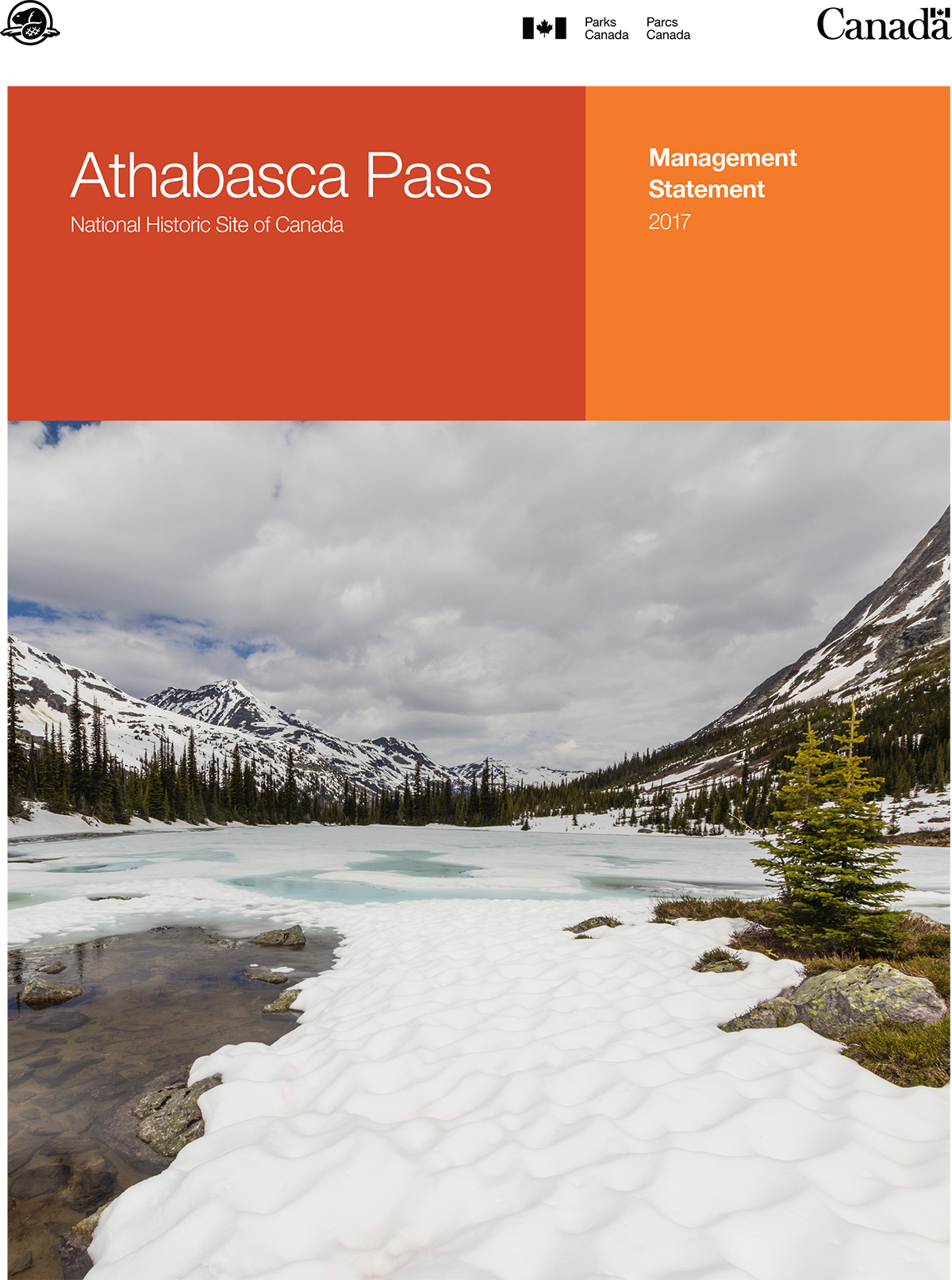Athabasca Pass National Historic Site of Canada Management Statement, 2017
Athabasca Pass National Historic Site
Table of contents

© Her Majesty the Queen in Right of Canada, represented by the Chief Executive Officer of Parks Canada, 2017
Cette publication est aussi disponible en français.
For more information about the management statement or about Athabasca Pass National Historic Site of Canada:
PO Box 10
Jasper, AB T0E 1E0
Canada
Approval
Approved on December 22, 2017 by:
Alan Fehr
Field Unit Superintendent
Jasper National Park
Parks Canada
Introduction
The Parks Canada Agency manages one of the finest and most extensive systems of protected natural and historic areas in the world. The Agency’s mandate is to protect and present these places for the benefit and enjoyment of current and future generations. This management statement outlines Parks Canada’s management approach and objectives for Athabasca Pass National Historic Site.
Athabasca Pass National Historic Site of Canada is recognized for its role as part of the main fur trade route between Canada and the Oregon Country from 1811 to the mid 1850s.
The Athabasca Pass crosses the height of land that forms the Continental Divide in western Canada and is situated in two provinces, with the Alberta side of the pass located entirely within Jasper National Park. In British Columbia, the Ministry of Forestry, Lands and Natural Resources Operations manages its section of the site as a heritage trail through a 200 m wide corridor. Specifically, the designated place for Athabasca Pass National Historic Site stretches from Kane Meadows in Jasper National Park to the Wood River, a distance of 18 km.
Used by Indigenous people for millennia, the Athabasca Pass and the “Committee’s Punch Bowl” at its summit have become iconic features of Western Canadian fur trade history, closely linked with the stories of Thomas the Iroquois, David Thompson and other Canadians, as well as Yellowhead Pass National Historic Site and Jasper House National Historic Site in Jasper National Park. The wilderness setting provides for a strong sense of place and connection to the past.
Management approach
The Alberta side of the pass falls entirely within Zone II Declared Wilderness Area of Jasper National Park and is administered by Parks Canada. Within British Columbia, the property is recognized as a provincially designated site that requires a permit from the Archaeology Branch with respect to any alterations. In addition, the province has assigned an Old Growth Management Area designation to the two drainages, which means the forested vegetation is managed for old growth attributes.
Parks Canada and the Province of British Columbia will continue to work together to ensure consistent and supportive management and protection of the site, and to increase awareness and appreciation for this unique cultural landscape and its role in Canadian history. This will include a strong relationship with Indigenous Peoples to ensure traditional knowledge, values and use of the site is included in the protection and interpretation of the area.
For a map, please refer to: http://www.pc.gc.ca/en/lhn-nhs/ab/athabasca/visit
Management objectives
- Parks Canada works with the Government of British Columbia to ensure the management of the site respects jurisdictions and shared goals and objectives for protection, interpretation, and visitor experience.
- Parks Canada works collaboratively with Indigenous Peoples in the planning, management and operations of our heritage places and is committed to building mutually beneficial relationships with Indigenous communities, based on trust, respect and understanding. In managing Athabasca Pass National Historic Site, Parks Canada works with interested Indigenous communities associated with Jasper National Park to incorporate traditional knowledge and values into the protection, interpretation and visitor experience of the landscape.
- Parks Canada protects the cultural and natural resources of the Pass to ensure the commemorative integrity of the national historic site; to protect the ecosystems of the Declared Wilderness Area; and to ensure the overall ecological integrity of Jasper National Park.
- Parks Canada works cooperatively with partners and stakeholders to enhance the understanding, awareness and visitor experience opportunities of the site and the family of national historic sites associated with Athabasca Pass and Jasper National Park.
- Parks Canada facilitates off-site experiences and learning opportunities for people unable to travel the route of Athabasca Pass through an educational and engaging communication and interpretation program.
- Date modified :